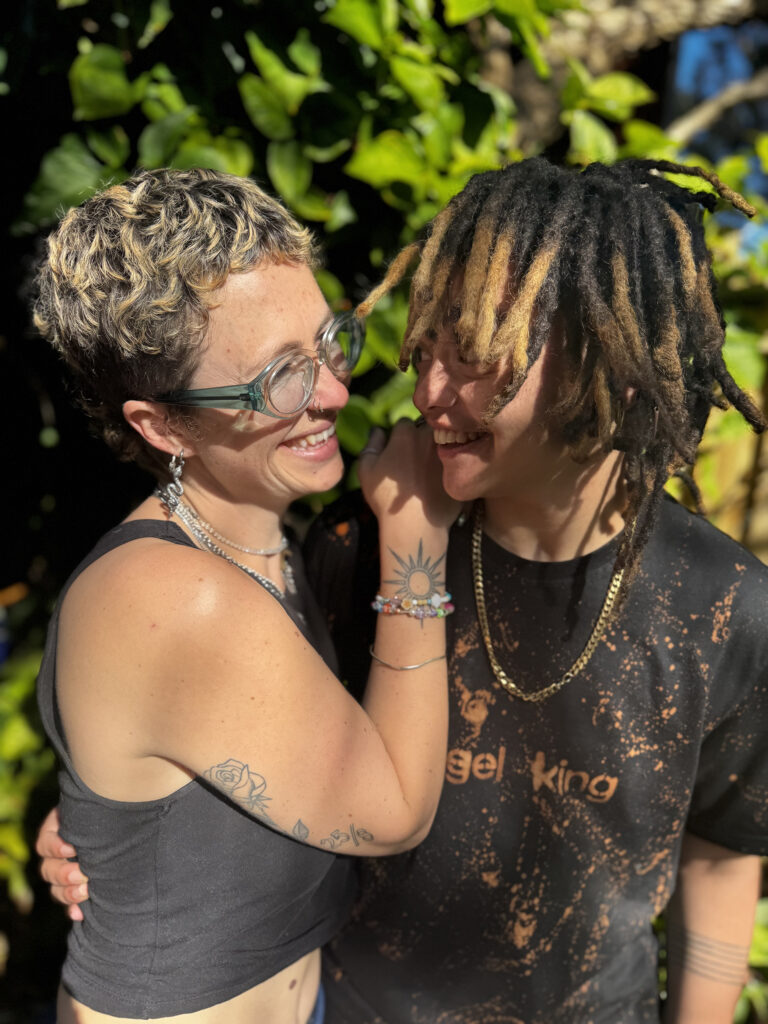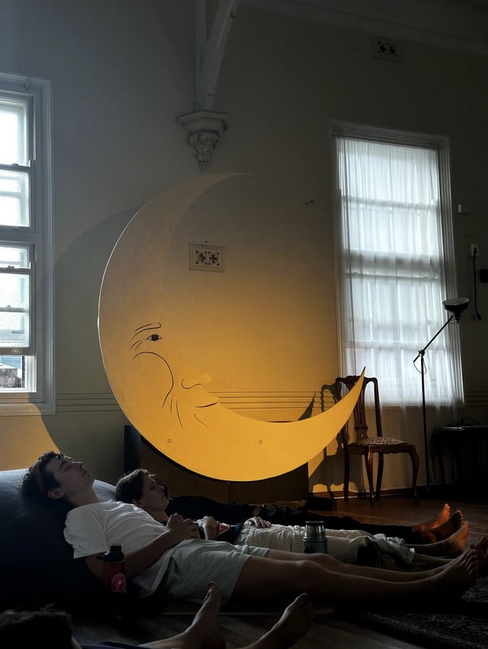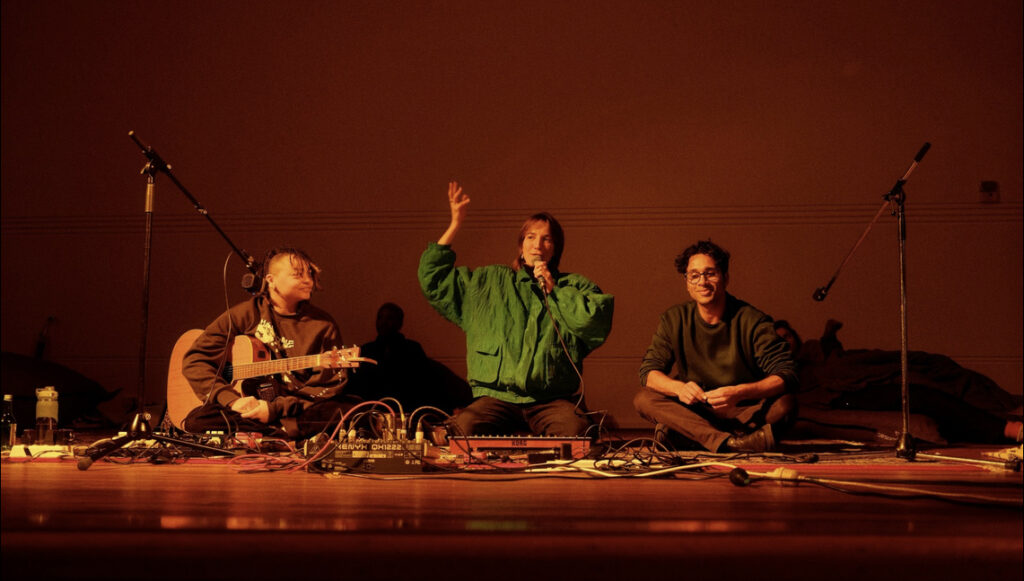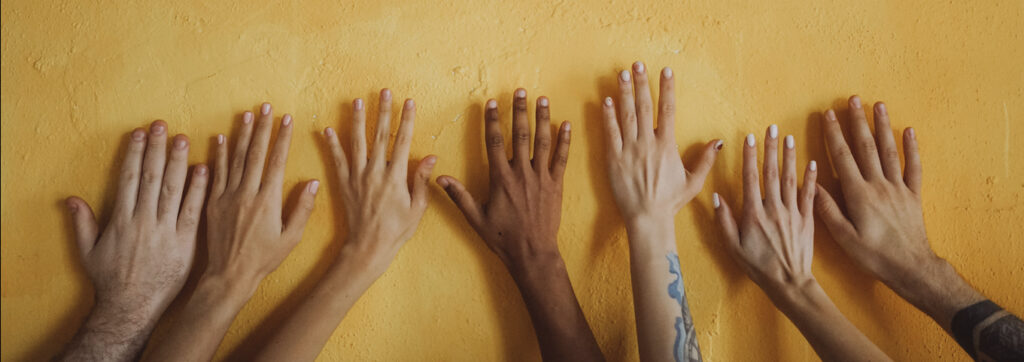Creative Profile: Kaleidoscope Collective
Kaleidoscope Collective is a community of gender queer and non- binary creatives facilitating spaces for creativity, joy, and gentle disruption. Since 2023, they have hosted more than 50 events from cosy workshops to bold gatherings supporting hundreds in self-expression and collective joy. All of their work is grounded in queer-affirming, trauma-informed practice. They focus on accessibility, collaboration, and creating safer spaces where participants can feel seen, celebrated, and empowered.
Beyond events, they nurture emerging artists through grassroots mentoring and community-driven projects. Their facilitators and artists bring expertise in arts-based therapy, community engagement, trauma-informed practice, queer cultural leadership as well as expertise in each of their creative practices.
The following is an edited version of responses from collective members Elinor Wilcken and Malaika Mfalme.

Your collective is made up of genderqueer and non-binary artists and facilitators. How do you select who can become a member of the group?
El: We don't really have a formalised outreach program for people to join. It just naturally happens with our collaborators. It’s a big commitment so people have to want to be a part of it. It's not really about us as the core organisers selecting who can become a member, but rather the member has to be excited to be a part of it. Then those people wanting to take on a bigger role are invited in. However, now we have created systems that are a little bit more formalised, making sure that there is alignment with people feeling comfortable in our non-hierarchical collective structure, to have a voice, and do the decision-making thing.
Do you ever encounter gender prejudice in your work, and if so, how do you deal with it?
Malaika: As a musician, all the time. Especially as a genderqueer person who once identified as a woman. There’s a lot of gender prejudice and misogyny within the music industry. And then you get the transmisogyny on top of it. I think the most frustrating is the gender confusion. People don’t really know what to do with you, so they just don’t hire you. Aside from those tokenizing times where it’s Mardi Gras, ‘we gotta find a gay person’, I find that I get most of my work through queer people, queer organisations, and people just looking to shout out to trans people.
As an event producer, I don’t find that I encounter much gender prejudice because I’m an organiser. So the ball’s in my court; I’m hiring people. I think that’s why I went into event production, because you have a little bit more control and I think people respect you a bit more.
El: Prejudice is why we created the Kaleidoscope Collective; so that we can make a space that is safe, where we are experiencing less transphobia, queerphobia, misogyny, transmisogyny, and things like that. Or if we are encountering it, we’re in it together and we have each other’s backs. Doing things alone can be really hard.
When we are looking to participate in mainstream activities it can feel really scary if you don’t know how people will respond.But because we’re mostly in queer spaces, we’re in a bit of a bubble. And as we start to branch out now, looking to run workshops within organisations, I think we’ll be facing a lot more of that. And that is a brave, conscious step.

Do you periodically check for diversity and inclusion within the collective itself? How do you practice what you preach?
Malaika: As a Black person in the collective, I’m often aware of how my presence can feel like holding the responsibility of ‘representing’ an entire voice or community. That’s a heavy role, and it’s something I think about a lot. It’s really important to me that I’m not the only person of colour in the room, that there are others alongside me also holding those perspectives and values.
Within the collective, we regularly talk about anti-colonial frameworks and actively challenge whiteness; those conversations are ongoing and deeply embedded in how we work. What’s been powerful is that I’m often not the one who has to bring it up. Everyone in the collective is committed to anticolonial work. We try to stay conscious of how power shows up, even in so-called “progressive spaces”.
El: A big part of practising what we preach is around acknowledging the systems we are raised by, and being wholeheartedly committed to questioning, being curious and having hard conversations around that. We can recognise the various intersections of marginalisation and privilege that each of us hold around visible queerness, race, disability etc. and ensure that these things are always open for discussion and that we need to be consistently interrogating what it is that we’re doing to not further the systems that oppress us.
We have a charter that informs the way we operate and has some core values that translate to procedure. We all sign onto this so that we practice what we preach. Some of the things included are “every voice must be heard” and “unity depends on participation”.

Trauma and stress can be delicate territory requiring advanced psychiatric expertise. How do you decide what you are qualified to take on?
Malaika: As someone who has experienced a lot of trauma and multiple bouts of mental ill health, while it doesn’t make me qualified to do the work of someone in psychiatric care, it does mean I have lived experience that allows me to assist in ways others might not be able to. I’m not doing this with any formal qualification as a therapist, but I do make sure that participants at our events feel safe and cared for at all times.
El: I want to controversially say that I don’t think ‘psychiatric expertise’ is always on point and paper qualifications aren’t always an indicator of being able to adequately take on trauma work. In saying that, I do want to recognise that within the collective, we have members with a variety of relevant training and a wealth of life experience to bring to the table. Of course it’s important to acknowledge that there may be times where we need to refer to people with more experience and training than we have, but it hasn’t happened yet.

What brings you the most joy?
El: My first thought was, I love seeing our projects come to life. But thinking more deeply, what’s brought me the most joy has been building the systems we work within; making our charter (LINK) , deciding how we do decision-making, what consensus looks like. Building something different to the systems that have marginalized and oppressed us, that is truly queer joy. It feels radical, revolutionary, and exciting.
Malaika: Making shit that’s disruptive, cool, funky, and weird with friends who are genderqueer and BIPOC, that’s my definition of joy. And at the end of most days, we can say we did a good job, had fun, and got paid. That’s magic.
Article by Tamara Winikoff
Tamara Winikoff is an independent consultant with extensive experience in arts advocacy, policy, and cultural leadership. She was a a founding member of the Inner West Creative Network and served as Executive Director of the National Association for the Visual Arts (NAVA) for 22 years, championing artists' rights and sector development. As Co-convenor of ArtsPeak, she coordinated national arts policy initiatives. Previously, she managed the Community, Environment, Art and Design (CEAD) program at the Australia Council for the Arts and lectured in Cultural Environment and Heritage at Macquarie University. Based in Sydney, she continues to influence the cultural landscape through strategic consultancy.
